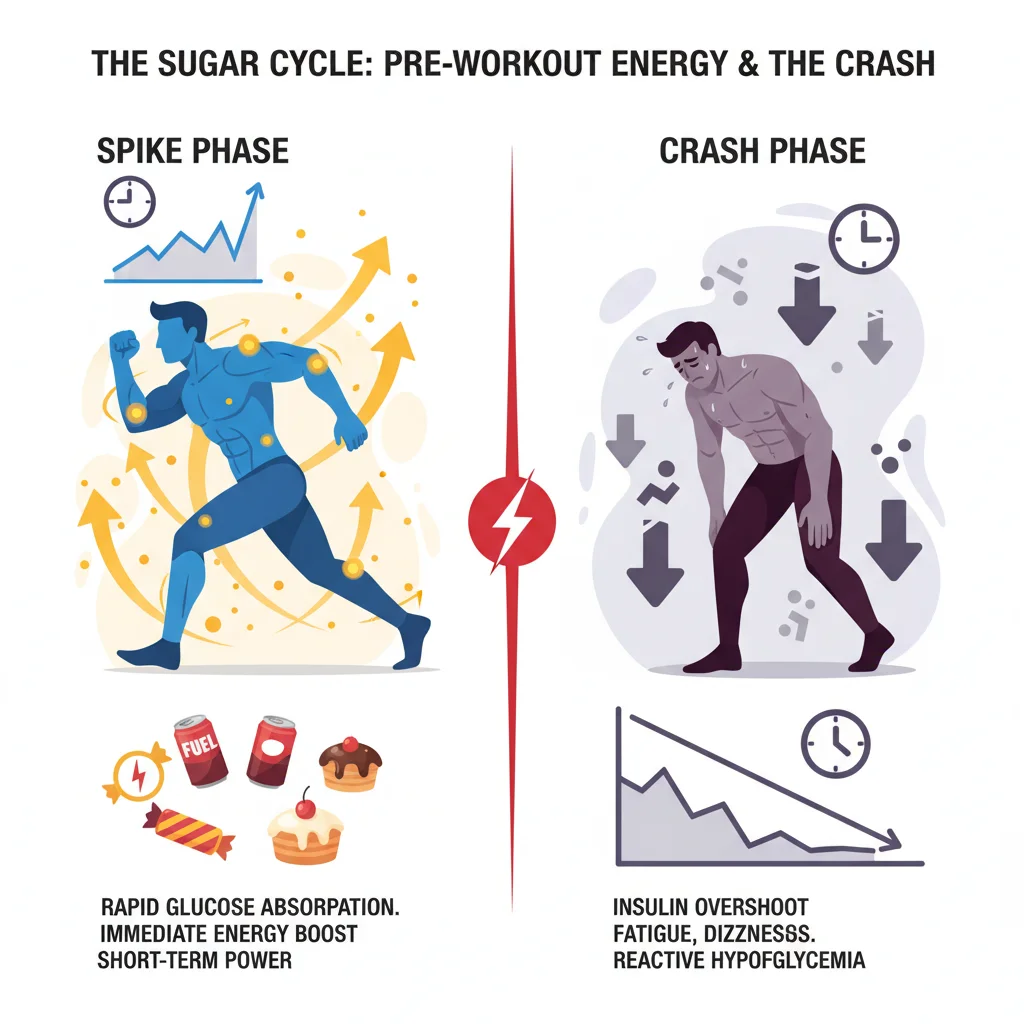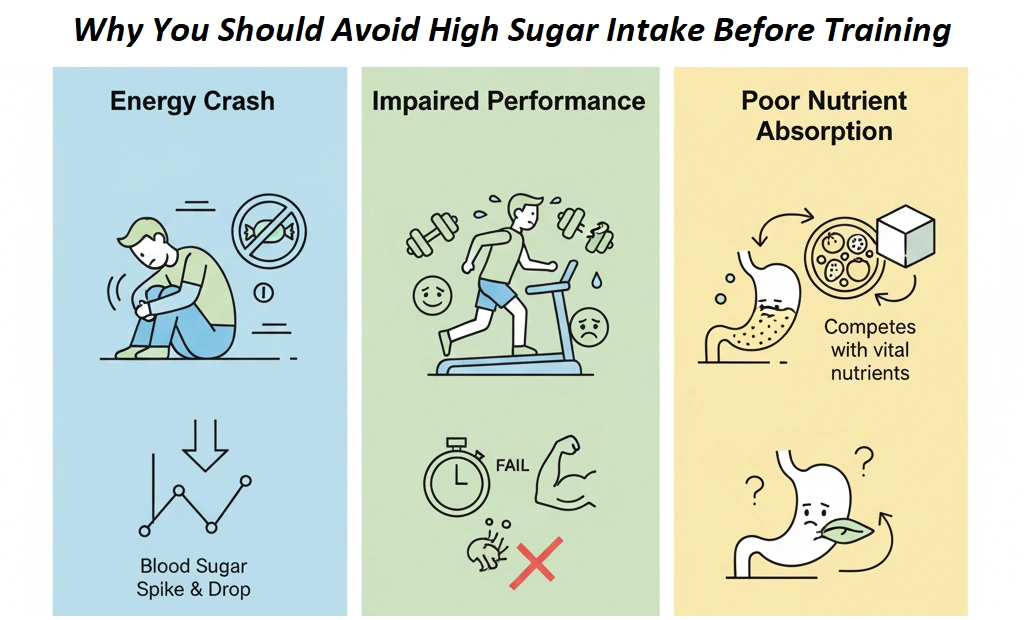Nutrition before training plays a crucial role in the determination of how effective you work, how you feel during training and how well you will recover afterwards. Many people believe that it is a smart way to get a quick energy boost to eat sugar -containing snacks or drink energy drinks. After all, sugar is a rapidly delayed carbohydrate, the glucose, the primary fuel of the body.
While sugar can offer a short -term energy push, it is too much to consume before training often falls backwards. Instead of persistent focus and strength, you can experience an energy crash, mental tiredness and even digestive complaints through your training halfway. In order to optimize performance, it is important to understand how sugar affects the body, why timing is important and which more intelligent nutritional strategies before training look.
The science of sugar and energy metabolism
1. How the sugar is processed in the body
If you consume sugar -containing foods or drinks – such as sweets, soda, pastries or sweetened energy potions – your body quickly breaks down in glucose. This glucose enters the bloodstream and leads to a quick increase in blood sugar levels. In response, the pancreas insulin, the hormone that is responsible for the transport of glucose in cells for immediate energy consumption or storage.

- Spike phase: The initial increase in blood sugar gives you a temporary energy boost.
- Fall phase: Insulin -over swinging can lead to blood sugar sinks under the baseline and you feel empty, hungry or unfocused.
This cycle is known as Reactive hypoglycaemia And is a frequent consequence of consumption of large quantities of simple sugar before training.
2. Role of glycogen in training
Muscles store glucose in the form of glycogen, which serves as a primary energy source during training. While a certain sugar intake can help fill the glycogen again, it does not necessarily improve performance. Instead, complex carbohydrates that have been eaten in advance offer a steady release of glucose and better support for the ongoing energy performance.
3 .. Hormonal effects
Beyond the blood sugar, the high sugar intake affects several hormones:
- Insulin: Spikes quickly, followed by a drop that can affect fat burning during training.
- Cortisol: Stress hormones can increase if the blood sugar dashed and increased the tiredness and has perceived the effort.
- Dopamine: Sugar stimulates reward paths, but overhanging can reduce natural motivation and create dependency.
Why a high sugar intake before training can be problematic
1. The crash in the middle of training
The biggest problem with high sugar intake is that Energy crash This follows the initial spike. Instead of constant energy, you can feel sudden fatigue in the middle of your session. This is particularly harmful to strength training or endurance training that is consistently exhausted.
2. Reduced fat relief
When the blood sugar and insulin level is increased, your body prioritizes the burning glucose instead of mobilizing fat stores. For athletes or people who want to improve body composition, this can limit the efficiency of fat loss.
3. Digestion control
Sugar -containing drinks and snacks can lead to flatulence, stomach cramps or nausea if they are consumed too close to training, especially with high intensity or endurance training. Liquids with high sugar concentration (such as lemonades or fruit juices) can also delay the gastric emptying, which leads to complaints.
4. Mental fatigue
A sugar accident not only affects physical energy, but also the cognitive function. A reduced availability of blood sugar for the brain can lead to a poor focus, slower response times and less motivation during training.
If sugar can be useful in training
Not every sugar is harmful in the context of the movement. In fact, there are strategic times when simple carbohydrates can be advantageous:
- During the endurance exercise (90+ minutes): Sports drinks, gels or fruit can deliver glucose to maintain the glycogen level and delay the tiredness.
- Restoration after training: A moderate amount of simple carbohydrates in combination with protein helps to fill in glycogen and accelerate the muscle repair.
- High intensity competition: Athletes who need fast energy bursts (e.g. sprinter, crossfit competitors) can benefit shortly before an event of small quantities of quick-digestioning carbohydrates.
The most important thing is that sugar can be a tool – but only if they are properly coordinated and consumed in moderation.
More intelligent nutritional selection before training
1. Complex carbohydrates for constant energy
Instead of refined sugar, choose Complex carbohydrates This digestibly slower and releases glucose gradually. Examples are:
- Oat flakes with fruit
- Brown rice or quinoa
- Sweet potatoes
- Whole grain bread
These foods offer stable energy supply without sharp tips or accidents.
2. Enclose lean protein
Adding protein to meals before training helps to maintain the feeling of satiety, to stabilize the blood sugar and to support the muscle repair. Examples:
- Chicken or turkey with rice
- Greek yogurt with berries
- Protein shakes on a plant -based basis
3 .. Healthy fats in moderation
Fats take longer to digest and are not ideal right before training, but small quantities can maintain the energy at longer sessions. Examples:
- Nut butter on wholemeal toast
- Avocado slices
- Chia or flat seeds in a smoothie
4. Moisture first
Water or electrolyte drinks are essential for liquid balance, thermoregulation and endurance. The dehydration, even 2%, can significantly reduce performance.
Example ideas before training before training
1–2 hours before training:
- Oatmeal with banana slices and almond butter
- Grilled chicken with sweet potato and vegetables
- Whole grain wrap with turkey, spinach and hummus
30–45 minutes before training (faster fuel):
- Banana with peanut butter
- Rice cake with almond butter and honey
- Small protein smoothie with berries and oats
Special considerations according to training type
1. Strength training
Prevent balanced meals with protein and complex carbohydrates 1 to 2 hours before lifting glycogen storage and avoiding. Avoid snacks with high sugar state that cause fluctuations in the starch in the middle of the session.
2. Endurance training
Complex carbohydrates and fluid intake are sufficient for runs or bicycle sessions under 90 minutes. With longer events, simple carbohydrates of intra training can be an advantage.
3 .. High -intensive interval training (HIIT)
Stable energy from complex carbohydrates prevents early tiredness. A recording with high sugar before HIIT can lead to early crashes and reduce the performance.
4. General fitness and weight loss
This training for Weight loss Or body composition should avoid a high sugar intake, as it can reduce fat mobilization and later trigger excessive meals.
Long -term strategies to reduce the dependency on sugar
- Plan meals in advance: With balanced meals, the selection of sugar -containing snacks prevents the last minute.
- Improve sleep: Adequate calm reduces the desire for quickly digestible carbohydrates.
- Lead stress: Meditation, deep breathing and practice of lower cortisol -oriented cravings for sugar.
- Repeat the taste buds: Due to gradually reducing sugar sugar, the body becomes the adaptation and lower the long -term desire.
Frequently asked questions
1. Is it bad to eat fruit before training?
No. Whole fruits such as bananas or berries contain natural sugar, but also provide fiber, vitamins and minerals. They are much better options than processed sugar -containing foods.
2. Should I completely avoid sugar before training?
Not always. Small amounts of natural sugar made of fruit can be advantageous, but large amounts of processed foods should be avoided.
3. What if I only have time for a quick snack before training?
Choose simple but balanced options such as a banana with nut butter, a protein bar with low sugar or a small smoothie.
4. Do Energy Drinks help?
Many energy drinks are high on sugar and caffeine. While caffeine can improve performance, the sugar content can lead to accidents. Sugar -free alternatives are often better.
Diploma
While sugar can provide rapid energy boosts, it is more likely that the performance of large quantities before training will hinder the performance than to help. The resulting blood sugar accident can reduce the endurance, strength and focus in the middle of the session and at the same time contribute to digestive problems and to limit the use of fat.
A more intelligent strategy is to fuel your body with balanced meals that combine complex carbohydrates, lean protein and healthy fats – constant energy and support of recovery. In most training sessions, this approach exceeds sugar -containing snacks or drinks. The only exceptions are long -term endurance events or immediate restoration after training, in which the targeted use of simple carbohydrates can play an advantageous role.
If you make more informed decisions, you not only avoid accidents in the middle of the session, but also improve the quality of training quality, the long -term results and general health.
References
- Gamekrup, AE (2014). Carbohydrate intake during training and performance. Nutrition.
- Ludwig, DS (2002). The glycemic index: physiological mechanisms with regard to obesity, diabetes and cardiovascular diseases. Jama.
- Ivy, JL (2004). Regulation of muscle glycogen repletion, the synthesis and repair of muscle protein after training. Journal of Sports Science & Medicine.
- Benton, D. & Young, HA (2017). Role of sugar in cognitive function. Nutrients.
- Burke, LM et al. (2011). Carbohydrates for training and competition. Journal of Sports Sciences.





